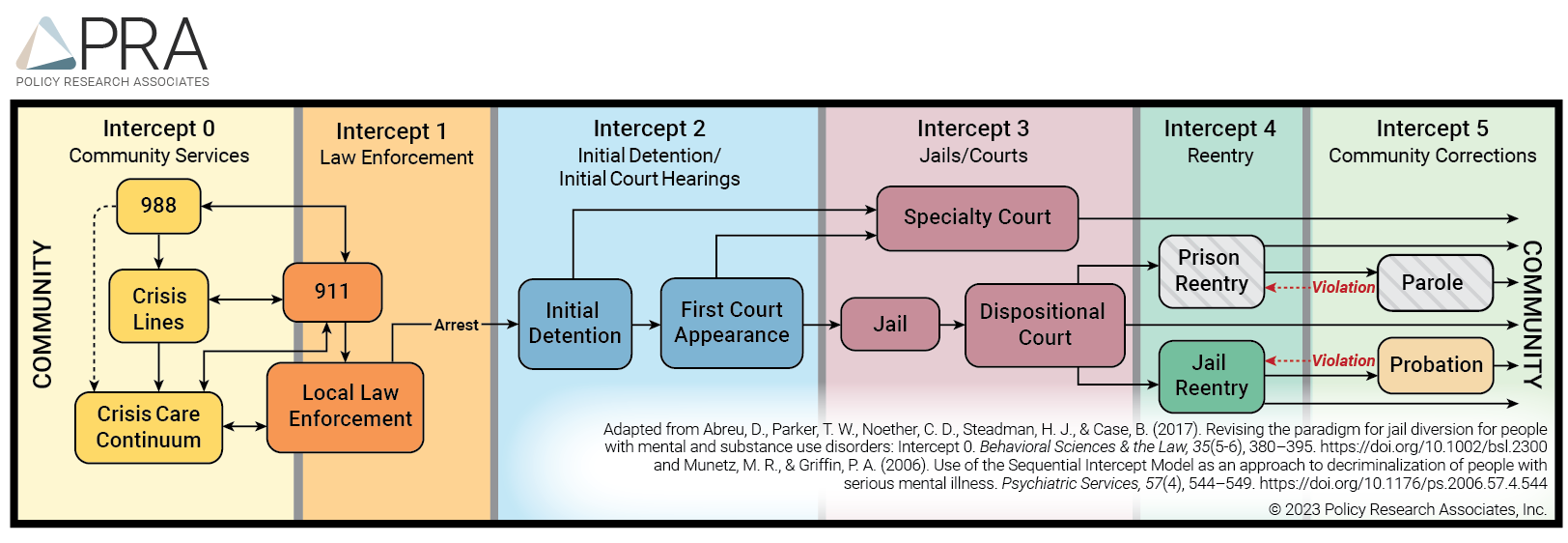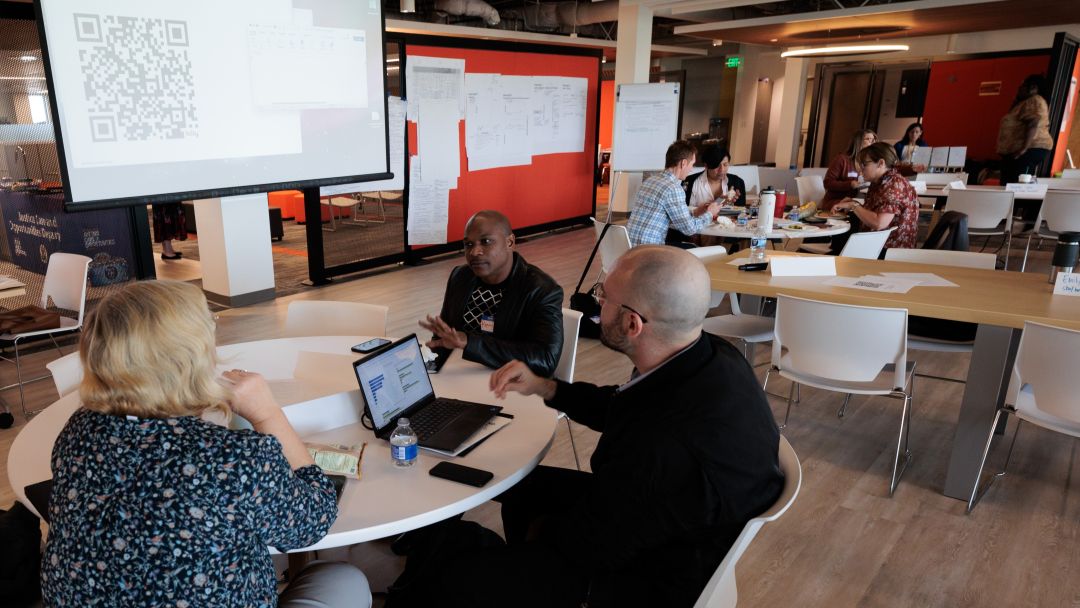Steadman et al. (2009) found that the prevalence of people with serious mental illness in criminal legal settings is three times higher than the general population. Abram and Teplin (1991) found that 72 percent of people with a serious mental illness in jail have a co-occurring substance use disorder.
Across the criminal legal system, impacted individuals face disproportionate adverse outcomes, including the following:
- They are less likely to make bail (Fader and Osher, 2015).
- They are more likely to have longer pre-trial incarceration (Fader and Osher, 2015).
- They are more likely to have severe disciplinary issues in jail or prison, and they experience higher rates of homelessness, unemployment, and substance use (James and Glaze, 2006).
- They are more likely to face technical probation violations (Dauphinot, 1996).
In addition, mortality rates for individuals released from prison are three times higher than the general population. Within the first 2 weeks of release, the mortality rate is 12 times higher than the general population (Binswanger et al., 2007).
Cross-system collaboration can improve outcomes and promote recovery. Bringing systems together to work on these complex issues takes training and careful preparation.
Our Solution
This 2-day facilitator training is designed to tap into and integrate local expertise and solutions by teaching participants how to deliver a Sequential Intercept Model (SIM) Mapping Workshop in their communities. The SIM Mapping Workshop encourages collaboration between the behavioral health and criminal legal systems, as well as other supporting services. Facilitator training participants learn how to guide local planning partners through the SIM Mapping Workshop by reviewing the Workshop model, design, and tools; receiving facilitation training; and working through practice SIM Mapping Workshop sessions. In this way, facilitator training participants learn to do the following:
- Familiarize SIM Mapping Workshop attendees with the situations and challenges faced by adults in their community with behavioral health needs and their experiences with the criminal legal system.
- Help attendees figure out what supports or services these individuals need and whether they already exist in the community.
- Assist attendees in creating a map of the local system, outlining gaps, opportunities, and resources for adults with mental and substance use disorders.
- Guide attendees through the process of setting priorities focused on improving responses for adults with mental and substance use disorders, both at the network and service level.
- Share examples of best and evidence-based practices from around the country that can be incorporated into a workshop.
- Facilitate the creation of a local strategic plan based on the gaps, resources, and priorities identified during the mapping process.
With help from a facilitator who has gone through the facilitator training, communities can:
- build beneficial cross-systems collaborations and relationships;
- improve the early identification of adults with behavioral health needs in the criminal legal system;
- reduce the chances that people will cycle in and out of the criminal legal system;
- promote and support recovery;
- enhance public safety; and
- improve quality of life for all.
Our Model
Mark Munetz, MD, Patricia A. Griffin, PhD, and Henry J. Steadman, PhD, developed the linear Sequential Intercept Model. The model highlights opportunities for community-based responses for people with mental and substance use disorders involved in the criminal legal system. It does this by outlining a series of moments, called intercepts, when an individual faces possible alternatives. At each intercept, the individual could either be connected with treatment services or end up going deeper into the criminal legal system.
The Sequential Intercept Model covers six intercepts. Each highlights a key part of the criminal legal process:
- Community services
- Law enforcement
- Initial detention and initial court hearings
- Jails and courts
- Reentry
- Community corrections
The Sequential Intercept Model Facilitator Training is a 2-day event designed to teach participants how to deliver the Sequential Intercept Model Mapping Workshop in their communities. During the training, attendees review the training design and tools, including the Sequential Intercept Model; receive training on facilitation skills; and are engaged in practice sessions.

Participants
People from many backgrounds can become SIM Mapping Workshop facilitators:
- Criminal legal system professionals, including law enforcement, pretrial services, courts, jails, and community corrections professionals.
- Behavioral health professionals, including mental health and substance use service providers.
- People with lived experience in the behavioral health and criminal legal systems, as well as family members and advocates.
- Social services professionals, including housing, health, and social services providers.
- State and/or regional representatives from agencies that fund services for adults in the behavioral health and criminal legal systems.
Impact in the Field
SIM Facilitator Trainings Lead to Statewide Change
We have hosted Sequential Intercept Model Facilitator Trainings across the country with the goal of developing statewide capacity to conduct systematic mapping exercises. The capacity derived from the SIM Facilitator Training has helped advance states’ efforts to improve how the criminal legal and behavioral health systems serve people with serious mental illness and co-occurring disorders. Key examples include the following:
- Massachusetts: Massachusetts trained cross-systems partners from the courts, the Department of Public Health, the Executive Office of Public Health and Safety, and UMass Chan Medical School to focus statewide efforts on addressing, preventing, and treating substance use and misuse, including preventing overdoses.
Follow-Up Assistance
Follow-up technical assistance is not typically needed after participating in a Sequential Intercept Model Facilitator Training. However, representatives of some jurisdictions find additional assistance useful. If you and your community want more support, the Systems Mapping and Training Center is here. The Center can host follow-up meetings, including facilitated strategic planning sessions, give guidance and resources, such as walking you through the Sequential Intercept Model: Next Steps website, or connect you with topical experts. These follow-up opportunities are offered on a fee-for-service basis.
References
Abram, K. M., & Teplin, L. A. (1991). Co-occurring disorders among mentally ill jail detainees. American Psychologist, 46(10): 1036-1045. https://psycnet.apa.org/doiLanding?doi=10.1037%2F0003-066X.46.10.1036
Binswanger, I. A., Stern, M. F., Deyo, R. A., Heagerty, P. J., Cheadle, A., Elmore, J. G., & Koepsell, T. D. (2007). Release from prison—A high risk of death for former inmates. The New England Journal of Medicine, 356:157-65. http://www.nejm.org/doi/pdf/10.1056/NEJMsa064115
Dauphinot, L. (1996). The efficacy of community correctional supervision for offenders with severe mental illness. Unpublished doctoral dissertation, University of Texas at Austin.
Fader-Towe, H., & Osher, F. (2015). Improving responses to people with mental illnesses at the pretrial stage: Essential elements. Council of State Governments Justice Center. https://csgjusticecenter.org/wp-content/uploads/2020/02/Improving_Responses_to_People_with_Mental_Illnesses_at_the_Pretrial_Stage_Essential_Elements.pdf
James, D. J., & Glaze, L. E. (2006). Mental health problems of prison and jail inmates. Washington, DC: United States Department of Justice, Office of Justice Programs. http://www.bjs.gov/content/pub/pdf/mhppji.pdf
Steadman, H. J., Osher, F. C., Robbins, P. C., Case, B., & Samuels, S. (2009). Prevalence of serious mental illness among jail inmates. Psychiatric Services, 60(6), 761–765. https://doi.org/10.1176/ps.2009.60.6.761



